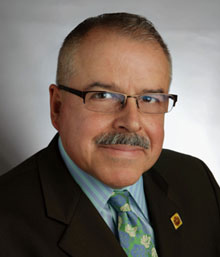Eduardo Diaz on the impact of a dysfunctional immigration system
CBS News asked noted figures in the arts, business and politics about their experience in today's civil rights movement, or about figures who inspired them in their activism.
Eduardo Diaz, executive director, Smithsonian Latino Center
Please share an experience in which you realized that the U.S. has/has not achieved equality in race, gender or sexual preference, and the impact on you.
The Latino New South is for real, and so is its new civil rights issue: the perilous impact of a dysfunctional immigration system.
This issue presented itself during a recent trip to Pelham, Ala., a Birmingham suburb with a sizeable Mexican population. As of the last Census, Alabama's Latino population grew 154 percent.
In Pelham, I met Victor Palafox, a 21-year-old university sophomore. Victor's father was recruited to work construction in the run-up to the 1996 Atlanta Olympics. The Palafox family, originally from Mexico City, eventually migrated to Pelham when Victor was six.
While Victor was touring me around Pelham, I asked him what he was going to do after graduation. He indicated he would get a Master's in Secondary Education. "Wonderful," I said, "What's next?" A sigh: "I could possibly return to Mexico to teach." Confused, I asked why Mexico? "Because I'm in legal limbo, and without immigration reform my path is uncertain." Stunned silence.
For now, Victor is able to stay by operation of Deferred Action for Childhood Arrivals, a 2012 program that allows undocumented young people to remain here while pursuing their education. Victor is an Alabamian, a top student at the state's flagship university and a productive citizen -- he works as Hispanic outreach coordinator for the Birmingham Civil Rights Institute, an institution with which the Smithsonian Latino Center hopes to work looking at Latino communities in the South.
The pull-push dynamic associated with the demand for inexpensive Mexican labor has, historically, produced systems and a legacy of dependency and convenience. I recall the Importation Program (1917-21) and the Bracero Program (1942-64), both timed with world wars when this country experienced chronic labor shortages.
Despite the very best efforts of the Palafox family to prove themselves good Americans, this country seems unable and unwilling to create a reasonable path to full agency in the promise of America, as it has done for previous immigrants. Let's hope that when Victor returns to a high school classroom, he will be known as Mister (not Señor) Palafox.
For more info:
- Smithsonian Latino Center
- Follow Smithsonian Latino Center on Twitter (@SLC_Latino), Facebook and YouTube
